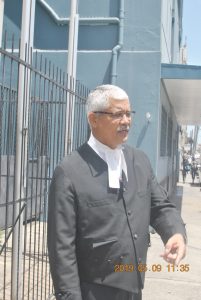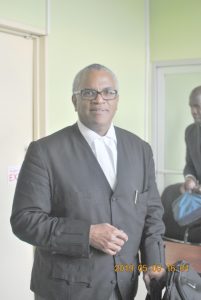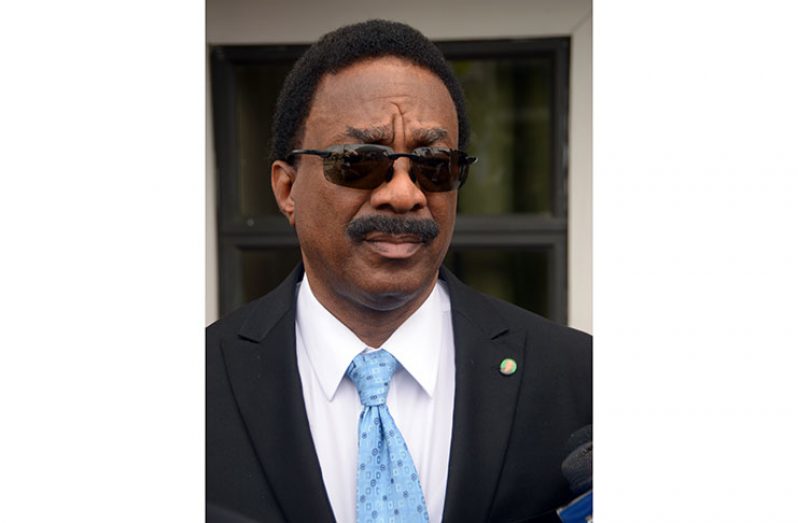– AG tells CCJ
ATTORNEY General (AG), Basil Williams, SC on Monday told the Caribbean Court of Justice that President David Granger is prepared to set a date for General and Regional Elections once he is duly advised by the Guyana Elections Commission (GECOM).
Addressing the CCJ panel led by President, Justice Adrian Saunders, Williams said: “The President of Guyana is an Executive President. So, if we look at the question of separation of powers, to propose that someone else gives the date for National Elections will collide unfortunately with that.” He said if there is no agreement for the two-thirds resolution in the Parliament, then of necessity, the president being given the powers under the Constitution, “should, after consultation with GECOM, dissolve the National Assembly and General and Regional Elections shall be held on a date fixed by the President,”.

The Attorney General reminded that under Guyana’s electoral laws, in order to create a new list of electors and national register of registrants, house-to-house visits must be pursued. He said almost half a billion dollars has already been spent in preparing for House-to-House Registration by GECOM. “The list has to be revised by additions and deletions and has to be done by house-to-house visits.”
Meanwhile, the CCJ appears to have taken into consideration the importance of “credible elections” being held in Guyana and has asked parties involved to seek consensus. This view was expressed on Monday by the CCJ which had planned to make a number of consequential orders but resolved to give the political leaders additional time to come to a possible amicable solution.
On June 18, 2019 the court upheld the No-Confidence vote against Government and quashed the appointment of Justice (Ret’d) James Patterson as Chairman of the Guyana Elections Commission (GECOM).
During the ruling, the court urged the two sides to meet but, while President David Granger has sent out an invitation for engagement to Opposition Leader, Bharrat Jagdeo, the two have not yet had a chance to interact.
While it is unknown what will become of the engagement, the attorneys representing their parties maintain starkly contrasting views. Senior Counsel Douglas Mendes is the lead attorney representing the opposition in both the GECOM Chair and no-confidence vote matters while Williams and Senior Counsel, Eamon Courtenay represent the government. And Senior Counsel, Stanley Marcus represent GECOM.
Elections without chairman
Mendes contended that elections could be held in Guyana without a GECOM Chair and within three months. He made the comments to the court even as more than half of the 7-member GECOM Commission, in recent times, has disagreed on the fixed timeline.
Nonetheless, Mendes maintained that elections ought to have been held by March 21, 2019 and proposed that the April 30, 2019, now expired, Official List of Electors (OLE) be used as is or be supplemented with any recent additions to the List. He also proposed that, to facilitate a limited three-month election preparation period, beginning Monday, that the Court assist with the setting of a 10-day timeline for the re-appointment of a GECOM Chair.
However, drawing the attention of the Senior Counsel back to his push for elections within a three-month period, CCJ Judge, Justice Winston Anderson questioned the consideration of such a period for the holding of “credible elections”.
Anderson defined “credible elections” as “elections in which the people of Guyana have confidence that their will is accurately expressed”.
In turn, Mendes responded: “Whatever the state of the List, whatever the state of the Commission, it really doesn’t matter. The constitution says that you have a three-month period within which to hold the elections.”

He added that it is the National Assembly which will determine whether this period can be extended and not the Commission. “I have not seen any provision which gives the Commission the power to say to the President that that date is invalid [and] you must fix another date,” he said.
However, his latter comment caused CCJ Judge, Justice Jacob Wit to read to Mendes Article 162 (2) of the Constitution which states: “Notwithstanding anything to the contrary in the Constitution, if the Elections Commission is satisfied that the holding of an election pursuant to the provisions of paragraph (2) of Article 60 on the day appointed therefore would be attended, either generally or in a particular area, by danger or serious hardship it may, after consultation with the Prime Minister and the Leader of the Opposition, by notice published in the Gazette – (a) postpone the holding of the election to a day specified in the notice; or (b) postpone the voting in any area specified in the notice to a day so specified.”
Mendes, in turn, denied that there was any “danger or serious hardship” in existence.
Meanwhile, when he spoke, Senior Counsel Courtenay pointed to the dangers of forcing upon a country a fixed-timeframe. He told the court that great care must be taken by the CCJ in declaring its consequential orders as these have the potential to determine whether credible elections are held and whether the results of a faulty List will be accepted by the people.
“When it comes to credible elections, the experience in Guyana, as was told to this court on the 9th and 10th of May this year makes it very clear, that there is real risk that if there is not confidence in what happens that there is a real risk that political parties will rule the day rather than the rule of Law,” he stated.
“In short, I submit to this court that we should move with all deliberate speed on this highly sensitive, highly political, highly constitutionally fraught issue.” He lobbied for submissions —which were later granted permission by the court— to be made by the involved Parties to further guide the court in its orders.
He also asked the court that the additional time requested by his counterparts be not dismissed but considered for the sake of serious discussions on the “very serious constitutional issues”.
Courtenay then added: “My respectful submission to this court is, one cannot and should not trivialise the necessity for there to be a List of Electors prepared in accordance with law. Anything short of that is a prescription for the Commission saying there’s a hardship or the language of [Article] that the date has to be postponed which creates a bigger problem.” Courtenay stated that while he does not underestimate how difficult coming to a compromise can be, it is in the best interest of the current situation that the involved Parties attempt an amicable agreement.
Meanwhile, Senior Counsel, Marcus argued that the three-month time period within the Constitution is “directory” rather than “compulsory”.
Questioned on date outside of the three-month time period for which a credible List can be generated for elections following the national registration exercise, Marcus gave this date as December 25, 2019.
He was unable, without further consultation with GECOM, to state whether this period could be reduced as a form of compromise.
Highlighting that GECOM has already expended over $700M towards preparation for house-to-house registration, he reminded that the National Assembly has the authority to extend the three-month time frame and leaders involved should take this into consideration for the benefit of a clean list.
Courtenay had also pointed out the flaw in the Opposition calling for the Cabinet and President to resign forthwith yet, at the same time, calling for the President to meet with the Opposition Leader. He pulled the curtains back to the dangers of a country without a Head of State and Ministers, expressing that it would put the entirety of Guyana in a vulnerable position
Gov’t continues
Addressing the court Williams reminded that Article 106 (7) of the Constitution states that the government and the President shall remain in office until after new elections. He also proposed that should the National Assembly not accede to an extension to the “unreasonable three-month time frame,” the President, after consultation with the Commission shall dissolve the National Assembly and General and Regional Elections shall be held on a date to be fixed by the President in accordance with Articles 70(2) and 61 respectively.
While the opposition feverishly objects to the holding of house-to-house elections, Williams reminded that it is the only exercise catered for under the National Registration (Amendment) Act 2007 for the creation of the National Register of Registrants (NRR).
We have a border controversy; we have porous borders where transnational crime and everything happens and we can’t protect it normally; we don’t have the people to protect it. So, at any moment crisis can occur in Guyana.”




.jpg)










